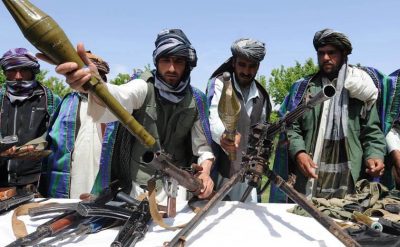By
Sattar Rind
Nobody it seems has paid a great deal of attention to why China has shown an interest in peace talks between the Taliban and the Afghan government held at Murree, Pakistan on 7th June. China was officially there as an observer. In the thirty years of the Afghanistan war, no one had mentioned China’s involvement one way or another.
China’s involvement could not be ruled out as, being a powerful country in this region, China has never before made its presence know in such circumstances.
The second meeting was scheduled for the 31st July but never took place as the ‘Quetta Shura‘ or Supreme Council of Taliban raised objections as to the legitimacy of the Taliban delegation involved.
At the same time Qatar’s representative also protested and refused to accept such talks, threatening also to resign.
However, when only two days were remaining in the scheduled talks, news surfaced that the caliph Mullah Omar had died two years earlier in a Karachi hospital in April 2013.
Following this news war broke out within the Taliban for its leadership as both Mullah Omar’s brother and son Mullah Yaqub made a claim for the Taliban leadership. Despite this however, Mullah Omar‘s deputy mullah Akhtar Mansoor declared himself the new leader of the Taliban.
It was also in 2013 that China entered into the talk’s ‘ring’ between Afghanistan and Taliban. Now there are reports that China has invited and hosted a Taliban delegation in Beijing twice before the Murree talks had even started.
China, though never remained in contact with the Taliban when they were in Kabul or accepted their government but they did contact them once to request that the Taliban not extend their support to militants in China’s Muslim majority province of Xinjiang and that unrest should be stopped in the area. This was accepted by the Taliban with the mediating role of Pakistan as reported.
Somehow the unrest was not completely over in Xinjiang province however, China ultimately taking hard action against the militants, almost crushing them in the province; for the time being at least.
For the Afghanistan peace talks though China used the phrase ‘It is an Afghan-led and Afghan-owned peace initiative’, the same phrase having also been repeated by the Pakistani foreign office. But such phrases have no weight more than mere phrases or can help decades long conflict in Afghanistan with the other regional countries and rest of the world.
Perhaps it was the reason China was in contact with Iran and Russia, to be alongside Pakistan and USA as part of such peace initiative talks between Afghanistan and the Taliban.
But with few initiatives China started to face obstacles from many countries and the hidden forces who are more interested in Afghanistan. Most recently the Afghan president Ashraf Ghani has announced that peace and reconciliation will be achieved by the state of Afghanistan alone through its own mechanisms. He categorically named Pakistan stating that he does not want help from them to bring the Taliban to the peace talks. On the contrary he wants Pakistan to stop activities of those on its own soil that are waging rebellion against Afghanistan.
This is the first setback to China, as achieving success in such peace talks, Pakistan was the key source for them. In addition to this it was the only advantage China had over the US in mediating the Afghan conflict.
It is also not true, as is being assumed, that China has no specific interest in Afghanistan. In fact China wants the centuries old Silk Road to be changed into the metalled road and railway track covering the Central Asian Counties through the Middle East and Turkey.
Therefore it would economically be of great benefit to China to see a permanent neutral Afghanistan instead of a battlefield of different forces, thus it is essential and necessary for China to bring the Taliban to an accommodating framework of peace in Afghanistan.
A wishing for and genuine effort towards do not necessarily make an easy solution to such things however. If this was the case it would be easy to wave a magical wand to change the currently war torn Afghanistan into a peaceful country.
There are a number of visible and invisible forces that have a lot of concerns in Afghanistan. The US has spent 1 trillion US dollars and sacrificed the lives of 2600 of its soldiers in a decade long war against the Taliban. They would not leave the central Asian countries to China or Moscow, or allow Iran to create any space over there.
Thus the US defiantly plays its role intelligently or, to some extent, dangerously as it is being claimed that newly entrenched forces of ISIS are being supported by the US.
The US is already in a bilateral agreement with Afghanistan as US forces plan to stay in Afghanistan for the coming decade or longer.
India is another rival of both China and Pakistan and would never like to see China be successful in Afghanistan and free Pakistani forces from the Afghanistan border, in turn shifting the Indian border. Rather, the Pakistan and Indian rivalry makes the Afghanistan situation worse.
There is a report in the Wall Street Journal that Iran, following the possible threat of ISIS, has started supporting the Taliban. Quoting a senior Afghan official WSJ claimed that Iran is hosting military training to the Taliban militants. Though Iran has denied the report, independent sources are not in agreement on Iran’s denial.
Consequently China is in deep crisis for mediating the Afghanistan conflict, there being more chances of failure than success; China it seems will therefore lose credibility and face value internationally. Usually China does not take part in such conflict resolutions. As a US diplomat termed it, China will come to know how difficult the world’s affairs are to deal with, though he wished China success in doing so.



No Comments Yet!
You can be first to comment this post!